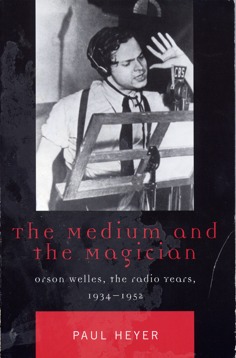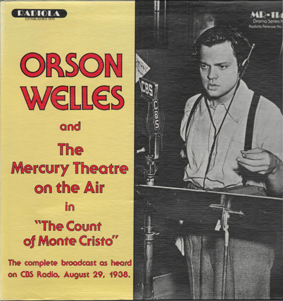Paul Heyer, The Medium and the Magician:
Orson Welles, the Radio Years 1934 - 1952
reviewed by Bertil Falk

The Medium and the Magician Publisher: Rowman & Littlefield, 2005 Length: 256 pp. ISBN: 0-7425-3797-8 |
My Welles collection includes of course The Magnificent Ambersons, Touch of Evil and whatever Welles is found on DVD, but above all his radio stuff has been with me ever since I bought, in the 1970’s, my first LP with The Shadow of the 1930’s.
Devoted fans of Orson Welles have always been collecting his radio broadcasts, but his radio has hardly been taken seriously by all those people who have turned his movies inside out. So you can imagine my excitement when I found Paul Heyer’s media study of Welles in a bookshop on Sunset Boulevard.
While the movies of Orson Welles can be described as mainstream, noir and Shakespeare, his radio showed a much broader spectrum. And he loved radio and said: “My big inventions were in radio and the theatre. Much more than in movies.” The cinéastes, who ignored his radio, never understood his attitude, perhaps not even knew about it, but when radio was over and no longer a vehicle for plays, Welles maintained his regret at the loss of radio.
At last Paul Heyer has repaired the sins of omissions. He takes us on a most entertaining, interesting and enlightening eighteen years journey from Welles’ being an anonymous voice in 1934 to his last radio shows, when he above all played Harry Lime from The Third Man on radio in order to finance his screen version of Othello.
And isn’t this an interesting observation. Heyer: “Welles’s radio career ended as it had begun. Not with Mercury, nor with educational fare on CBS, but, as pointed out in chapter 1, with an adaptation of Sherlock Holmes, the first version having been done during his adolescence for a small radio station set up by the Todd School in Woodstock, Illinois. Now, in his final radio play, he is again in the Conan Doyle oeuvre: this time as Moriarty struggling with Holmes on a fight to the death on a ledge in the Alps.”
Between those two radio events there is an enormous amount of Orson Welles radio. And when we peep into the radio situation in New York City, when Orson Welles was on the air, we find much more of interest than the famous adaptation of H. G. Wells’ War of the Worlds. That radio play panicked many listeners who thought that they were tuned in to a news programme.

|
War of the Worlds was just one of the plays that was broadcast by Welles’ Mercury Theatre on the Air, which, together with what Welles did on Campbell Playhouse, “set new standards for radio drama” as Heyer puts it. Bram Stoker’s Dracula, Shakespeare’s Julius Caesar, Daphne du Maurier’s Rebecca, Dickens’s A Christmas Carol, Mark Twain’s Huckleberry Finn are titles showing that Welles touched everything from suspense, horror, high drama and mysteries to adventure.

|
It is also fascinating to read about how the recording equipment was used and how manuscripts were written and revised. The book is filled with all sorts of information about Orson Welles and radio in particular and about radio in general terms.
Anyone interested in radio, script writing and the golden years of radio will find an overwhelming amount of information in this book. And with that I think that the coffee stains on the cover of my copy are justified.
Copyright © 2009 by Bertil Falk

